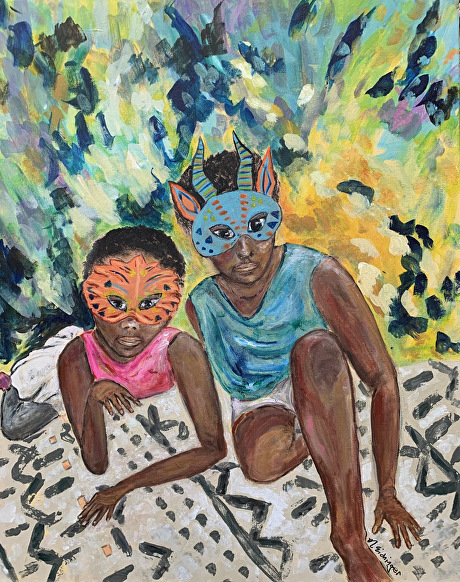
MIRNA AND HANAN – My African-American grandchildren are easy to love.
Love, Hate, Indifference
Is finding love tough? Has anyone said that you were difficult to love? What does it mean when a leader says to go in peace and practice love? How is that done in a world where hate groups spout conspiracy theories? These questions are on my mind as I see homeless people struggling to stay alive and watch newscasts of countries bombing their next-door neighbors. If a person can’t love, be loved, or practice love, how can there be peace in the world? Issues around love and hate are complex, and with the war in Israel and Gaza escalating, I have a need to unpack them in my mind.
The definition of love is difficult to pinpoint. According to the Berkeley Well-Being Institute, it is a feeling, an action, a state of being, and a motivation that artists, scientists, and philosophers have tried to define throughout the ages. Despite the confusion about what it is, most people believe that a person in love is invested in the well-being of the object of their affection for that individual’s sake alone. This means that they want the person to be happy and healthy. Practicing love and going in peace is doing everything you can to see it happen. Love between nations is doing everything in a government’s power to help another country thrive. The United States overcame its anger and put Japan on a growth path at the end of WWII. In one sense, we acted as parents with the goal of raising successful, happy children. The occupation was a great success, resulting in economic stability and a close relationship between our two countries.
A parent with a helpless newborn gives of his or herself selflessly, ensuring that the infant survives. Though not a two-way love relationship at first, with nurturing over the years, it can turn into one. It is not easy to sacrifice your freedom to raise a child any more than it is to care for a bedridden relative later in life. Yet, those who make sure the infant or elder is fed, their dog is walked, they go to the doctor, and their prescriptions are picked up are practicing love.
And though the person may complain about the burden of caring for children or a sick parent, they miss having them close by when the child leaves home or the parent dies.
Hate, a powerful emotion as strong as love, is defined as intense hostility, extreme dislike, and loathing. Stemming from fear, insecurity, and mistrust, it makes hateful people turn toward individuals and groups with whom they identify, often to join forces for revenge. Hate, like love, can feed on itself and intensify the emotion. Hatred can be aimed at a person, a group, or a nation. When it leads to violence and suffering, it can last for generations.
Strange as it may be, love and hate have a shared opposite emotion–indifference. People falling out of love lose interest in the well-being of the person they once cared for. Without fear or anger, they become less interested in revenge. Love and hate, like two balloons when popped, will lie deflated, be empty of feeling, lack energy, and die.
The Middle East conflict goes back thousands of years. Since the fires of hate have been continuously stoked, extinguishing them won’t result in a love relationship. Indifference might be the first step to healing. But peace can be possible if people ignore their differences and, as my father always said,” live and let live.” The fighting factions might live peacefully if they become indifferent to each other’s beliefs and way of life. Continuing as they are, the war between Israel and Hamas will escalate, increasing the pain and suffering of thousands of innocent people.
I do not believe in an eye for an eye and a tooth for a tooth, yet I do think nations have the right to defend themselves with the goal of de-escalating emotions, not the annihilation of their adversary. In the Israeli/Gaza war, indifference and tolerance may lower emotions and allow both nations to thrive.
Art is always for Sale. MIRNA AND HANAN is a 30″ by 24″ deep canvas acrylic painting available for $ 885. For information contact me at marilynne@eichingerfineart.com
Do share your thoughts on my blog site at www.eichingerfineart.com/blog
Eichinger books are available in bookstores and online in ebook and paperback formats. Click the link to purchase on AMAZON.
References
Huntington, C. (2023) What is Love? Definition, Signs & Types. Retrieved from https://www.berkeleywellbeing.com/what-is-love.html
Abrams, A. (2017) The Psychology of Hate. Psychology Today. retrieved from https://www.psychologytoday.com/us/blog/nurturing-self-compassion/201703/the-psychology-hate
